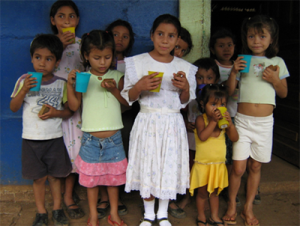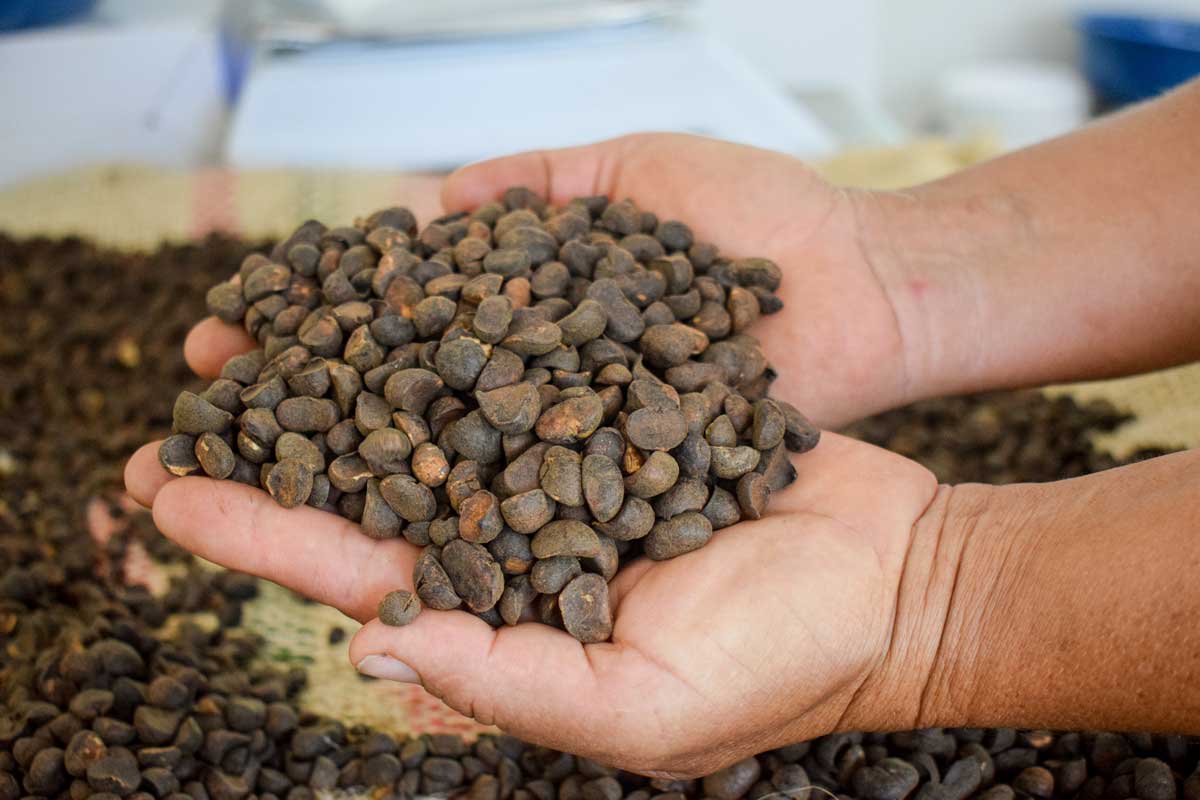I am delighted by this opportunity to write about Maya nut (Brosimum alicastrum) for the Crops for the Future website. Maya nut is an exemplary “Crop for the Future”. It is a nutritious and delicious neotropical rainforest tree seed and its commercialisation and consumption can reduce deforestation, malnutrition and rural poverty. It was a staple food for the ancient Maya and other Pre-Columbian cultures that cherished and cultivated it in “food forests”.
Our primary goal with Maya nut is to restore it to the local daily diet. We accomplish this only rarely, unfortunately, because Maya nut, as many traditional foods, is stigmatised as food for forest animals and the landless poor. “When we saw families eating Maya nut we realised their situation had gotten really bad. They must have had no corn and no money to buy any”.

Salvadoran children with Maya Nut school lunches (drink and cookies). Photo by Nidia Lara, AGAPE, El Salvador.
We have managed to overcome this stigma in certain communities/regions where we have been able to find funding for our “Healthy Kids, Healthy Forests” programme, which is a Maya nut school-lunch programme for rural schools. We have found that children are less judgmental about the social aspects of Maya nut; and because it tastes good to them, they eat it delightedly and clamour for it when we arrive with Maya nut for their noontime meal. A primary component of the programme is that participating schools agree to reforest at least 2 hectares of land, or at least 2,000 Maya nut trees, for future harvests. This is how we ensure sustainability for the programme. Unfortunately, it has been extremely difficult to find funding for Healthy Kids, Healthy Forests. Apparently children’s health is not a true priority for donors, or maybe they feel that “the bases are covered” in terms of school lunches and that other development projects are more important to fund.
Our experience with Healthy Kids, Healthy Forests shows that the programme results in positive short-term outcomes and guaranteed long-term outcomes. In the short term, children come to love Maya nut because it tastes good. In communities with nearby Maya nut forests, children will harvest nuts and ask their parents to cook it at home. Through their children, mothers learn to cook and appreciate Maya nut and are more interested in reforestation and forest conservation than before. In many communities where we have implemented Healthy Kids, Healthy Forests, mothers stop buying and using Maya nut firewood (which is often the only use for Maya nut in those communities). In the long term, the food forests established in participating communities will produce 30,000lb of Maya nut for community consumption and/or sale within 15 years. This contributes directly to food security in an increasingly insecure agroeconomic climate. These forests will also provide valuable ecosystem services, including protection of soils, water and biodiversity and provision of fuelwood and fodder for livestock for 150-200 years.
Agronomically, Maya nut outperforms other crops. It is one of the most drought-resistant trees in Latin America, thriving where other species cannot. Historically, thousands of communities have survived drought and famine eating Maya nut when their crops failed due to drought, war or pests. Because of its extensive root system and unique physiology, Maya nut remains evergreen and produces food and fodder even in years when other crops fail due to lack of rain. It is also exceptionally resistant to hurricanes and flooding. It is a dominant species in gallery forest, where it stabilises riverbanks and prevents erosion, even during severe floods. With expected increases in duration and severity of drought and frequency and intensity of hurricanes and tropical depressions due to climate change, it is likely that Maya nut will again be an important source of food for people and wildlife in the near future.
I am grateful for this opportunity to share our strategy for restoring one “crop for the future” to the daily menu in the communities where we work and look forward to hearing from you, comments and criticisms are welcome!
Erika Vohman
Founder, Executive Director
Maya Nut Institute
mayanutinstitute@gmail.com





